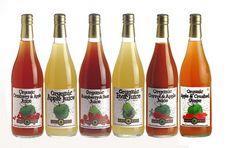
James White has been pressing and bottling a range of Soil Association certified organic juices since 1998, but despite expansion of its range, initially the company struggled to find adequate supplies of UK-grown fruit.
“What was available was often in poor condition,” says proprietor Lawrence Mallinson. “In the last couple of years the situation has improved significantly and almost all of our apples come from the UK now, but there is still a shortage of pears.”
“We much prefer to use UK fruit because then we have much greater control over quality and blend of varieties,” says Mallinson. “The UK fruit that we buy now costs us significantly more than the juice we bought from the continent, but it is worth paying extra because of the increased quality and because by paying a reasonable price it is helping UK growers stay in business.”
In the early days supply difficulties became a real issue, says Mallinson. “Initially we were in a situation where we had to press anything we could get out hands on, regardless of quality, but now the situation is much improved. We are able to produce a conventional juice with pure Bramley, although we cannot yet do this as an organic option.”
The organic juice range that James White produces has opened up new markets for the company, that were previously denied to its range of classic juices.
“In the beginning people were hugely excited by the growth in the organic market,” says Mallinson, “and I think it’s an important niche that isn’t going to go away. I do believe that the competition for organic produce is going to get worse, though,” he says. “Developing countries such as Poland, for instance, have the kind of infrastructure that is ripe for development and will be able to convert to organic readily.
“Both our organic and non-organic juices appeal to two almost separate markets. The organic range which now comprises of: apple, pear, carrot & apple, cranberry & apple, apple & crushed ginger, raspberry & pear and appeals to a younger, more urban customer than the Classic range.
“We experienced a very rapid period of sales growth initially,” Mallinson concludes, “but the last few years have found growth opportunities harder to come by and sales are still growing at a slower pace. Despite some negative press comment I remain confident that there is a solid long-term market for organic juices, but I doubt they will ever be more than a small part of the total juice market.”



